

Does Anything Matter? by Peter Singer. Exit from comment view mode.
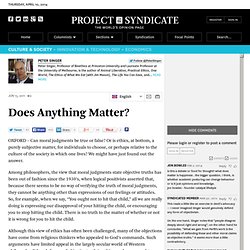
Click to hide this space OXFORD – Can moral judgments be true or false? Or is ethics, at bottom, a purely subjective matter, for individuals to choose, or perhaps relative to the culture of the society in which one lives? We might have just found out the answer.
Ethics. The three major areas of study within ethics are:[1] Meta-ethics, concerning the theoretical meaning and reference of moral propositions, and how their truth values (if any) can be determinedNormative ethics, concerning the practical means of determining a moral course of actionApplied ethics, concerning what a person is obligated (or permitted) to do in a specific situation or a particular domain of action[1] Defining ethics[edit] The word "ethics" in English refers to several things.[6] It can refer to philosophical ethics—a project that attempts to use reason in order to answer various kinds of ethical questions.

[citation needed] It can also be used to describe a particular person's own, idiosyncratic principles or habits.[7] For example: "Joe has good ethics. " The Best Ways to Discuss Ethics - Francesca Gino. By Francesca Gino | 9:05 AM March 2, 2011 [For more, visit the Communication Insight Center.]

Thinking Ethically: A Framework for Moral Decision Making. Thinking Ethically: A Framework for Moral Decision Making Developed by Manuel Velasquez, Claire Andre, Thomas Shanks, S.J., and Michael J.
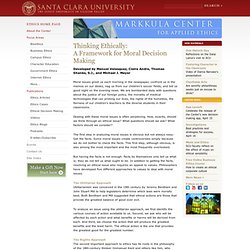
Meyer Moral issues greet us each morning in the newspaper, confront us in the memos on our desks, nag us from our children's soccer fields, and bid us good night on the evening news. We are bombarded daily with questions about the justice of our foreign policy, the morality of medical technologies that can prolong our lives, the rights of the homeless, the fairness of our children's teachers to the diverse students in their classrooms. Dealing with these moral issues is often perplexing.
The first step in analyzing moral issues is obvious but not always easy: Get the facts. But having the facts is not enough. Ethics Without the Sermon. “Like some Triassic reptile, the theoretical view of ethics lumbers along in the far past of Sunday School and Philosophy I, while the reality of practical business concerns is constantly measuring a wide range of competing claims on time and resources against the unrelenting and objective marketplace.”

So writes the author of this article as she introduces a procedure to test pragmatically the ethical content and human fallout of everyday decisions in business and other organizational settings. First you have to define the problem as you see it, then (insofar as possible) examine it as outsiders might see it. You explore where your loyalties lie and consider both your intentions in making the decision and whom your action might affect.
You proceed to the consequences of disclosing your action to those you report to or respect, and then analyze the symbolic meaning to all affected. Scene 1. Scene 2. Scene 3. Scene 4. EJBO - Electronic Journal of Business Ethics and Organization Studies. By: Matti Estola [biography] We study the ethics of competition in a market economy.
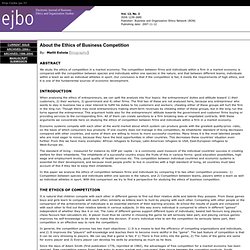
The competition between firms and individuals within a firm in a market economy is compared with the competition between species and individuals within one species in the nature, and that between different teams, individuals within a team as well as individual athletes in sport. Morality Quiz/Test your Morals, Values & Ethics - Your Morals.Org. Moral Psychology Primer. Dan Jones has a terrific article in the April issue of Prospect, titled “The Emerging Moral Psychology.”

We’ve included some excerpts from the article below. Long thought to be a topic of enquiry within the humanities, the nature of human morality is increasingly being scrutinised by the natural sciences. This shift is now beginning to provide impressive intellectual returns on investment. Philosophers, psychologists, neuroscientists, economists, primatologists and anthropologists, all borrowing liberally from each others’ insights, are putting together a novel picture of morality—a trend that University of Virginia psychologist Jonathan Haidt has described as the “new synthesis in moral psychology.” Kohlberg's Moral Stages. W.C.
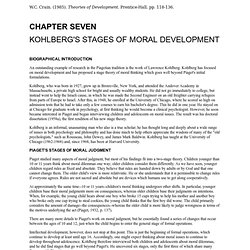
Crain. (1985). Theories of Development. Prentice-Hall. pp. 118-136. The Virtuous Life. Justice: What's the Right Thing to Do? List of Values. The following list of values will help you develop a clearer sense of what's most important to you in life, as explained in the article Living Your Values.
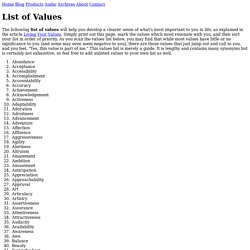
Simply print out this page, mark the values which most resonate with you, and then sort your list in order of priority. As you scan the values list below, you may find that while most values have little or no significance to you (and some may even seem negative to you), there are those values that just jump out and call to you, and you feel, "Yes, this value is part of me. " This values list is merely a guide. It is lengthy and contains many synonyms but is certainly not exhaustive, so feel free to add unlisted values to your own list as well. Steve RecommendsHere are my recommendations for products and services I've reviewed that can improve your results.
Site Build It! Online Guide to Ethics and Moral Philosophy. This web-site is designed to give users a very general "introduction to Ethics.
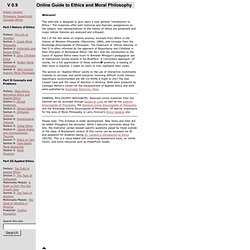
" The materials offer both historical and thematic perspectives on the subject. Moral relativism. Moral relativism may be any of several philosophical positions concerned with the differences in moral judgments across different people and cultures. Descriptive moral relativism holds only that some people do in fact disagree about what is moral; meta-ethical moral relativism holds that in such disagreements, nobody is objectively right or wrong; and normative moral relativism holds that because nobody is right or wrong, we ought to tolerate the behavior of others even when we disagree about the morality of it.
Not all descriptive relativists adopt meta-ethical relativism, and moreover, not all meta-ethical relativists adopt normative relativism. Richard Rorty, for example, argued that relativist philosophers believe "that the grounds for choosing between such opinions is less algorithmic than had been thought", but not that any belief is equally as valid as any other.[1] Variations[edit] Descriptive[edit] [edit] Normative[edit] Morality and Ethics: An Introduction. By Stephen M. Perle, DC, MS Morality and ethics are terms often used as if they have the same meaning. At other times, they are used as if they have no relationship to one another.
An Ethical Decision-Making Model.